Global Food Forum: Wine fears new tariff strike, China’s grain hit ‘undeserved’, Anthony Pratt says Australia should double food exports
The Australian wine industry says it can deal with minor Chinese tarifffs moves, but the potential for a punitive hit is a major concern.
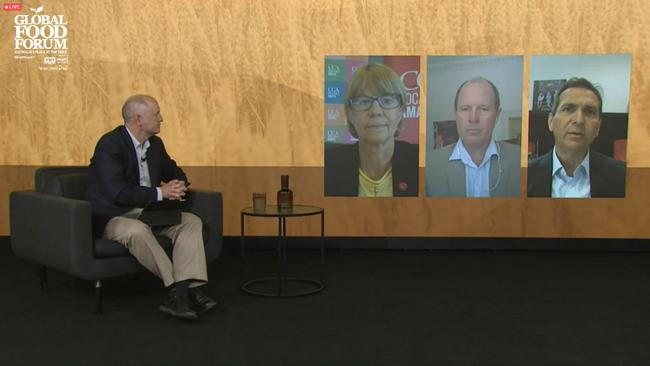
Good afternoon and welcome to our coverage of The Global Food Forum.
Wednesday’s discussions have come to a close but the forum continues on Thursday with speakers from companies inlcuding Macquarie Group, Elders, nestle, and Impossible Foods in conversation with The Australian’s senior business journalists.
- Read more great stories on The Australian’s Global Food Forum page.
On Wednesday Anthony Pratt gave the keynote address and Coles’ Steven Cain has discussed the group’s relationship with farmers.
The panel discussion on how Australia has fared in the global pandemic featured Bega’s Barry Irvin, Rabo’s Tim Hunt, the NFF’s Fiona Simson and agriculture specialist Sue Neales.
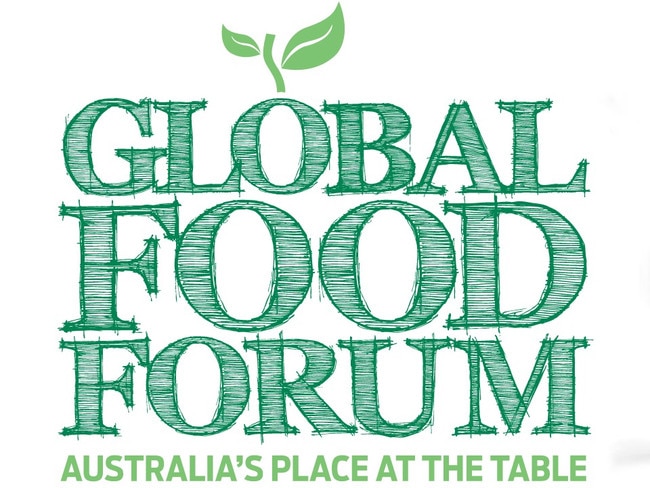
Domino’s Pizza’s chief executive Don Meij has discussed the impact of COVID on his delivery business, followed by a panel on the future of the food industry featuring Arnotts’ George Zoghbi, CCA’s Alison Watkins and Cobram Estate’s Rob McGavin.
LaManna Premier Group chief executive Anthony Di Pietro discussed the booming demand for fruit and vegetables with The Australian’s John Stensholt.
The final panel for the day, hosted by The Australian’s Glenda Korporaal, discussed trade relations with China.
The panellists were:
- Brett Hosking, Chairman, GrainGrowers
- Kristy Carr, Founder and Chief Executive Officer, Bubs Australia
- Doug Rathbone, Chairman, Rathbone Wine Group
12.30pm: COVID has not dented ag’s appeal
The Australia’s Global Food Forum had wrapped up for its first day.
Despite the supply chain challenges of COVID, Australian farmers have fared well during the pandemic, with today’s panellists highlighting the investability of the sector.
With Australians spending more time at home, the quality of food and where it comes from has been at the forefront of consumer’s mind. Farmers are also connecting directly with consumers, allowing them to meet the requirements of customers.
The food manufacturing companies agreed that Australia had potential to have a competitive advantage in exporting food and beverages. It is now the challenge of the industry to grab the opportunities that the federal government has laid out in its $1.5 billion manufacturing roadmap.
The trade war with China remains a key concern for the sector. The wine industry is fearful that Beijing will slap it with tariffs as a response to its anti-dumping investigation.
11.57am: Wine industry frets over tariff hit

Rathbone Wine Group Chairman Doug Rathbone said the wine industry was concerned about the potential of tariffs.
Last month, three Australian wine exporters were named as part of Chinese government investigations into dumping and subsidies.
“If there’s a modest tariff put on, the industry will function. If it’s a situation like barley which is punitive we’ll have to deal with it, But there is a concern, there’s no doubt about that,” he said.
11.48am: Vertical integration an asset: Bubs
Bubs Australia chief executive Kristy Carr said virtual integration had been an asset for the baby formula company.
“In terms of the impact COVID we’ve been fortunate to be considered an essential service... we’ve been able to continue throughout the pandemic because we use our own milk supply and manufacturing facility,” she said.
But she said the daigou channel, where individuals purchase commodities overseas for consumers in China, had been impacted by a reduction in Chinese students and travellers in Australi
11.35am: China grain hit ‘devastating’
GrainGrowers chairman Brett Hosking, says China’s announcement of 80 per cent barley tariffs in May was devastating for the industry.
“It was a bit of a blow. We felt they were undeserved... We felt disappointed that there had been such a breakdown of a relationship,” he said.
“It’s ripped the confidence out of the barley market... the flow on effect is felt by our growers and their rural communities. There’s just less dollars to go around.”
11.26am: Customer profile changing: LaManna
LaManna Premier Group chief executive Anthony Di Pietro said the profile of the company’s customers had changed during COVID.
Currently, half of the business’ exports are small retailers. The other half comprises partnerships with major supermarkets.
“We have quite a balanced domestic business. Internationally we’ve got a 50-50 partnership with a stone fruit grower. Stone fruits are the backbone of our international market in Asia,” he said.
He said the future of fresh food production in Australia is positive but requires significant investment.
“We need patient capital. If you have a look at the big success stories in this country they are businesses that have grown organically and been very patient with capital,” he sai
11.07am: Whole food chain counts
Boundary Bend Olives chief executive Rob McGavin said maintaining consumer trust was vital as the country seeks to boost local manufacturing.
“We want to ensure consumers have great trust in our food to build on the advantage we have had over many, many years. I’m really optimistic about Australian food production... and what the governments doing is really assisting that to happen.”
Ms Watkins said investing in food manufacturing was essential to counter the stagnation of productivity.
“When thinking of food manufacturing, it’s not just the food item itself, or the ingredients - it’s the whole chain we need to think of,” she said.
She said the government’s $1.5 billion manufacturing roadmap had given industry a chance to “grab the ball and run with the opportunities.”
“We can build and leverage technologies which take us to that premium end.”
“The investment allowance that the government has committed to really stimulate investment in our sector is something we need to drive the scale so that’s a real opportunity.”
10.52am: Strong Christmas after lockdown woe: Coke
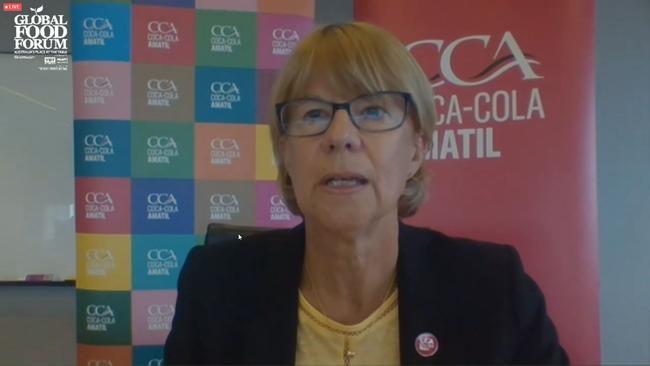
Ms Watkins said Victoria’s second lockdown had proved a challenge for Coca Cola Amatil.
“We do have a lot of product that need to cross borders so it has been really, really disruptive.”
But she said a homebound holiday period would also provide a boost for the company.
“We’re expecting a strong Christmas. People are going to be home and entertaining at home. Supermarkets are going to see really strong demand for Christmas so making sure we have stock where it needs to be and supply chain issues are things we need to work around.”
10.47am: Consumers reached for familiar brands
The panel has begun by considering consumer habits during COVID-19.
Arnott’s Biscuits chief executive George Zoghbi said consumption patterns had changed throughout the pandemic.
“We saw an increase in snacks that was solid across the entire pandemic,,, In soup we saw an unbelievable demand in the first few weeks with panic buying and then it declined,” he told the forum.
Coca Cola Group Managing Director Alison Watkins agreed that the pandemic had been beneficial for household brand names.
“Consumers want to resort to what is familiar. The brand Coca Cola has been doing well and we’ve seen strength in our no sugar varieties,” she said.
10.31am: Lockdown was pizzas boom: Meij
Domino’s Pizza’s chief executive Don Meij said the company’s deliveries spiked as countries had entered into lockdowns.
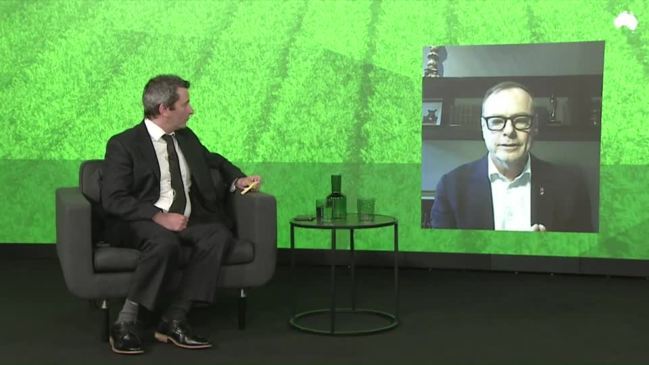
“As you come out of lockdowns deliveries have still been high and returns have been quite healthy,” he said.
The company introduced contactless delivery and car park delivery - allowing customers to pick up pizzas without having direct contact with staff.
He said the company’s stable costs, with interest rates low, had allowed the company to offer customers continual low prices.
He said the company had seen an increase in frequency of purchases with customers indulging in takeaway during lockdown.
“In Australia, we eat one eighth the amount of pizzas that Americans would eat, but we do eat a lot of Domino’s pizza. In markets like Japan which is a low frequency market, we’ve seen an increase of customers and their frequency of return and various parts of Germany and Europe,” he said.
“One of the things that has been successful is we can get you to experience a Dominos order and see how hot and fresh we get that product to you, the quality of the drivers and the speed of the service.”
Read more: Covid fast tracks online food shift
10.13am: ‘Remarkable resilience’ in agriculture
Mr Hunt said there was strong viability in the sector and an appetite to invest in farms and buy land, despite the challenges presented by COVID-19.
“We saw outside investment interest... given what we have been through - three years of drought and worst economic crisis since WWII it’s remarkable how resilient the sector has been,” he said.
“There’s a lot of things going on that have helped sustain very high prices during a difficult period.”
“What has gone off the radar a little bit is swine fever in China, at least for the animal protein industry, dwarfs the impact of COVID-19.”
Mr Hunt said tackling agriculture labour shortages was a key issue in the sector.
“I think part of the answer does lie in having flexibility in the workforce and encouraging people to move to regional areas and participate in this area. I think the government initiatives in the budget will help unlock this,” he told the forum.
We’ve seen the recognition globally that urban based workers have limited flexibility, but it’s unlikely to be the complete answer to this labour shortage. Not everyone without a job in the city will go to regional areas.”
He said a viable solution was hiring offshore workers from countries with low virus levels,
“We quarantine them sensibly and give them the opportunities that they’re looking for and make sure we get these vital crops picked without causing virus transmission in this country.”
10.04am: Tree changers an ag opportunity: Rabo
Head of RaboResearch Food & Agribusiness, Rabobank Australia Tim Hunt said the migration of city dwellers to regional towns during the pandemic was an opportunity for the agriculture sector.
“The other trend we’d like to see is to generate the jobs that we need for expansion of these industry,” he told the forum.
“So people aren’t just working on urban based jobs in the region, but working on regional jobs due to rising agriculture and manufacturing.”
9.57am: We overcame supply chain: NFF’s Simson
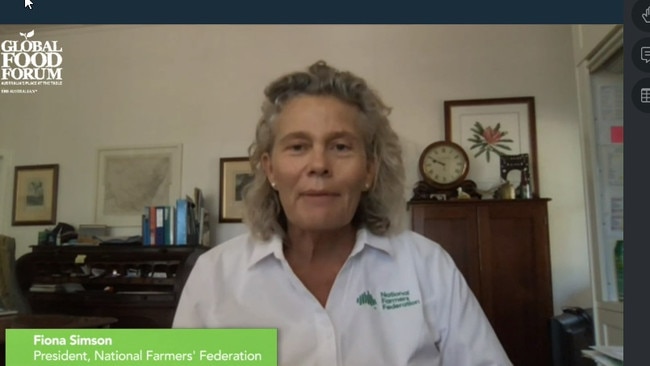
National Farmers’ Federation President Fiona Simson said Australia’s agriculture sector has fared well during the pandemic, despite early supply chain issues.
“That focus early on, despite some snags in the second stage with state border closures, has meant that we’ve been able to keep growing great food and getting that to our customers,” she said.
“Early on we saw there were problems with the supply chain when people flocked to the shops for toilet paper, but we’ve been able to overcome these problems.”
9.51am: ‘US may trigger decoupling’
Mr Every said diversifying away from exporting to China to mitigate the rising risks was crucial.
“This is not about Australia versus China. This is about several countries against the US,” he said.
“The US is rolling ahead with a set of sanctions against China which could see a decoupling of the global economy and the monetary system. This could mean China saying to food exporters, we love your product but we don’t want to pay in US dollars.”
“This has huge implications for everyone’s balance sheet if a large part of your cash flow is coming in and goes straight back into China.”
9.47am: ‘K-shaped’ global recovery
Head of Financial Markets Research, Asia-Pacific, at Rabobank Michael Every has kicked off the “scene setting” session at The Australian’s Global Food Forum.
Mr Every said post-COVID recovery was “K-shaped”, meaning there was deep splits in people’s experiences of the pandemic.
“Some people you can say they’ve never had it so good. Interest rates are low... generally speaking things are looking comfortable. Other people are worrying about their kids and their job.”
“That impacts rights across society in terms of consumption patterns.”
9.41am: Covid strengthened ties: Coles

Coles’ chief executive Steven Cain says COVID-19 has strengthened the supermarket’s relationships with farms to create longevity and sustainability of produce.
“We only take about 10 per cent of farm output in Australia and we deal in total,” he told The Australia’s Global Food Forum.
“Part of our job is to make the farms better so we get a better quality product to sell... the closer the relationship we have with suppliers the better it is in a crisis.”
Read more: Coles responding to ‘at home’ lifestyles
9.30am: Diversify exports: Pratt

Visy Industries’ executive chairman Anthony Pratt is delivering the keynote speech at The Australian’s Global Food Forum.
He said the Prime Minister’s recent speech at the National Press Club highlighted the government’s manufacturing plan, with food and beverage as one of the six focus sectors.
“In 2013 we set ourselves a goal of doubling Australia’s food exports by 2025 and it’s now grown by two-thirds in just eight years,” he said.
“In ten year Australia has signed nine free trade agreements with four more under negotiation.”
He stressed the importance of Australia’s diversifying its export customer base to have a competitive advantage in the food and beverage sector.
9.22am: China grain plea
Ahead of The Australian’s Global Food Forum, Australian grain growers have appealed to the Chinese and Australian governments to mend their differences as they await news on an appeal against tariffs that have decimated the $1.2bn barley trade with China.
“It does feel as if there has been a breakdown at a government level,” the chairman of industry lobby group, GrainGrowers, Brett Hosking told The Australian.
“You have to have an established dialogue which can continue when there are challenges.






To join the conversation, please log in. Don't have an account? Register
Join the conversation, you are commenting as Logout